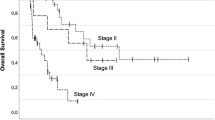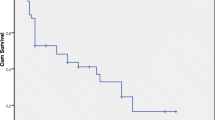Abstract
Because of the rarity of adrenocortical carcinoma, survival rates and the prognosis for patients who have undergone operation are not well known. The purpose of the French Association of Endocrine Surgery was to evaluate these factors over an 18-year period. A trend study was associated to assess changes in the clinical and biochemical presentations as well as the surgical evolution. A total of 253 patients (158 women, 95 men) with a mean age of 47 years were included. Cushing syndrome was the main clinical presentation (30%), and hormonal studies revealed secreting tumors in 66% of the cases. Altogether, 72% (n=182) of patients underwent resection for cure, and 41.5% (n=105) of them had an extensive resection because of metastatic cancer. A lymphadenectomy was performed in 32.5% (n=89) of the cases. The operative mortality was 5.5% (n=14). Patients were given mitotane as adjuvant therapy in 53.8% of the cases (n=135). The results of staging were stage I in 16 patients (6.3%), stage II (local disease) in 126 patients (49.8%), stage III (locoregional disease) in 57 patients (22.5%), and stage IV (metastases) in 54 patients (21.3%). Neither tumor staging nor the rate of curative surgery changed during the study period. More subcostal incisions were performed, and the use of mitotane increased significantly. The 5-year actuarial survival rates were 38% overall, 50% in the curative group, 66% for stage I, 58% for stage II, 24% for stage III, and 0% for stage IV. Multivariate analysis showed that mitotane benefited only the group of patients not operated on for cure. A better prognosis was found in patients operated on after 1988 (p=0.04), in those with precursor-secreting tumors (p=0.005), and in those at local stages of the disease (p=0.0003). Thus mitotane benefited only patients not operated on for cure. Curative resection, precursor secretion, recent diagnosis, and local stage were favorably associated with survival.
Résumé
Introduction: La survie et le pronostic des patients opérés d’un corticosurrénalome restent mal connus car il s’agit d’une tumeur rare. L’Association Française de Chirurgie Endocrinienne s’est fix pour but d’évaluer ces facteurs pendant une période de 18 ans. Les changements de présentation clinique, biochimique et l’évolution de la prise en charge chirurgicale ont également fait l’objet d’une analyse. Méthode: Deux cent cinquante trois patients (158 femmes, 95 hommes), d’une moyenne d’âge de 47 ans. ont été étudiés. Un syndrome de Cushing a été la situation clinique la plus fréquente (30%), et les études hormonales ont montré une tumeur sécrétante dans 66% des cas. Soixante-douze pour cent (n=182) des patients ont bénéficié d’une chirurgie à visée curative et 41,5% (n=105) ont eu une résection étendue en raison des métastases. Un curage ganglionnaire a été réalisé dans 32,5% (n=89) des cas. La mortalité post-opératoire a été de 5,5% (n=14). Du mitotane a été utilisé dans 53,8% des cas (n=135). La classification tumorale a montré : 16 stades I (6,3%): 126 stades II (maladie locale) (49,8%), 57 stades III (maladie loco-régionale) (22,5%); et 54 stades IV (métastases) (21.3%). Résultats: Le stade des tumeurs et le pourcentage de chirurgie à visée curative n’ont pas évolué. II a été réalisé plus d’incisions sous-costales et l’utilisation du mitotane n’a cessé de croître de façon significative. La survie actuarielle à 5 ans a été de 38% : 50% dans le groupe opéré à visée curative, 66% dans les stades I, 58% dans les stades II, 24% dans les stades III, et 0% dans les stades IV. L’analyse multivariée a montré que le mitotane a apporté un bénéfice de survie au groupe de patients opérés à visée palliative. Une amélioration du pronostic a été notée après 1988 (p=0.04), chez les patients sécrétant des précurseurs (p=0,005) et dans les stades locaux (p=0,0003). Conclusion: Le mitotane n’a été profitable qu’aux patients opérés à visée palliative. Le caractère curatif de la chirurgie, le type de sécrétion hormonale, la période récente de diagnostic et le stade local ont été des facteurs favorables de survie.
Resumen
Introducción: Dada la poca frecuencia del cáncer adreno-cortical el pronóstico y la supervivencia de los pacientes intervenidos no es bien conocido. La Asociación Francesa de Cirugía Endocrina se ha marcado como objetivo valorar estos factores durante un periodo de tiempo de 18 años. Además, pretendemos analizar los cambios clínicos y bioquímicos, así como la evolución del tratamiento quirúrgico. Método: Se estudiaron 253 pacientes (158 hembras y 95 varones) cuya edad media fue de 47 años. El cuadro clínico más frecuente fue el del síndrome de Cushing (30%) y los análisis hormonales demostraron la existencia de un tumor secretor en el 66% de los casos. El 72% (n=182) de los pacientes fueron intervenidos quirúrgicamente con fines curativos y en el 41.5% (n=105) hubieron de efectuarse resecciones ampliadas por metástasis. Una linfadenectomia se realizó en el 32.5% (n=89) de los casos. La mortalidad operatoria fue del 5.5% (n=14). El 53.8% (n=135) de los pacientes recibieron como terapia adyuvante Mitotane. La clasificación tumoral registra: 16 estadios I (6.3%); 126 estadios II (enfermedad local) (49.8%). 57 estadios III (enfermedad loco-regional) (22.5%) y 54 estadios IV (con metástasis) (21.3%). Resultados: El porcentaje de tumores en los diferentes estadios no se ha modificado, ni tampoco la cirugía con fines curativos. La vía de abordaje más frecuente ha sido la subcostal y el empleo, como terapia adyuvante, de Mitotane no ha cesado de aumentar significativamente. La supervivencia actuarial global a 5 años fue del 38%; 50% en el grupo operado con fines curativos: 66% en pacientes en estadio I, 58% en los del estadio II, 24% en los del estadio III y 0% en los del estadio IV. Un análisis multivariante ha demostrado los beneficiosos efectos del Mitotane, por lo que a la supervivencia se refiere, en el grupo de pacientes intervenidos con fines paliativos. El pronóstico ha mejorado desde 1988 (p=0.04), en los pacientes secretores de precursores (p=0.005) y en los pacientes con enfermedad local (p=0.0003). Conclusiones: El Mitotane sólo es útil en casos de cirugía paliativa. La cirugía radical, el tipo de secreción hormonal, el diagnóstico precoz y el estadio de enfermedad local, son los factores más favorables en cuanto a la supervivencia se refiere.
Similar content being viewed by others
References
Lipsett, M.B., Hertz, R., Ross, G.T.: Clinical and pathophysiologic aspects of adrenocortical carcinoma. Am. J. Med. 35:374, 1963
Hutter, A.M., Kayhoe, D.E.: Adrenal cortical carcinoma: clinical features of 138 patients. Am. J. Med. 41:572, 1966
Icard, P., Chapuis, Y., Andreassian, B., Bernard, A., Proye, C.: Adrenocortical carcinoma in surgically treated patients: a retrospective study on 156 cases by the French Association of Endocrine Surgery. Surgery 112:972, 1992
Van Slooten, H., Schaberg, A., Smeenk, D., Moolenaar, A.J.: Morphologic characteristics of benign and malignant adrenocortical tumors. Cancer 55:766, 1985
MacFarlane, DA.: Cancer of the adrenal cortex: the natural history, prognosis and treatment in a study of fifty-five cases. Ann. R. Coll. Surg. Engl. 23:155, 1958
Kaplan E.L., Meier P.: Nonparametric estimation from incomplete observations. J. Am. Stat. Assoc. 53:457, 1958
Harrell, F.E., Jr., Lee, K.L., Matchar, D.B., Reichert, T.A.: Regression models for prognostic prediction: advantages, problems, and suggested solutions. Cancer Treat. Rep. 69:1071, 1985
Concato, J., Feinstein, A.R., Holford, T.R.: The risk of determining risk with multivariate models. Ann. Intern. Med. 118:201, 1993
9. Van Slooten, H., Moolenaar, A.J., van Seters, A.P., Smeenk, D.: The treatment of adrenocortical carcinoma with op-DDD: prognostic implications of serum level monitoring. Eur. J. Cancer. Clin. Oncol. 20:47, 1984
Luton, J.P., Cerdas, S., Billaud, L., Thomas, G., Guilhaume, B., Bertagna, X., Laudat, M.H., Louvel, A., Chapuis, Y., Blondeau, P., Bonnin, A., Bricaire H: Adrenocortical carcinoma: clinical features, prognostic factors and therapeutic results in 105 patients from a single center (1963–1987). N. Engl. J. Med. 322:1195, 1990
Haak, H.R., Hermans, J., van de Velde, C.J., Lentjes, E.G., Goslings, B.M., Fleuren, G.J., Krans, H.M.: Optimal treatment of adrenocortical carcinoma with mitotane: results in a consecutive series of 96 patients. Br. J. Cancer 69:947, 1994
Kasperlik-Zalustra, A.A., Migdalska, B.M., Zgliczynsky, S., Ma-kowska, A.M.: Adrenocortical carcinoma: a clinical study and treatment results of 52 patients. Cancer 75:2587, 1995
Nader, S., Hickey, R.C., Sellin, R.V., Samaan, N.A.: Adrenal cortical carcinoma: a study of 77 cases. Cancer 52:707, 1983
Henley, D.J., Van Heerden, JA., Grant, CS., Carney, J.A., Carpenter, P.C.: Adrenal cortical carcinoma: a continuing challenge. cSurgery 94:926, 1983
Icard, P., Louvel, A., Chapuis, Y.: Survival rates and prognosis factors in adrenocortical carcinoma: a study of 41 surgically treated patients in a single center. World J. Surg. 16:753, 1992
Chapuis, Y., Icard, P., Barei, R., Pitre, J., Dousset, B., Louvel, A., Luton, J.P.: Possibilitiés et limites du traitement chirurgical des corticosurrénalomes malins: a propos d’une série de 74 cas. Chirurgie 123:61, 1998
Venkatesh, S., Hickey, R.C., Sellin, R.V., Fernandez, J.F., Samaan, N.A.: Adrenal cortical carcinoma. Cancer 64:765, 1989
Didolkar, M.S., Bescher, R.A., Elias, E.G., Moore, R.H.: Natural history of adrenal cortical carcinoma: a clinicopathologic study of 42 patients. Cancer 47:2153, 1981
Cohn, K., Gottesman, L., Brennan, M.: Adrenal carcinoma. Surgery 100:1170, 1986
Gröndai, S., Cedermark, B., Eriksson, B., Grimelius, L., Harach, R., Kristoffersson, A., Rastad, J., Udén, P., Akerström, G.: Adrenocortical carcinoma: a retrospective study of a rare tumor with a poor prognosis. Eur. J. Surg. Oncol. 16:500, 1990
Thompson, N.W., Cheung, P.S.: Diagnosis and treatment of functioning and nonfunctioning adrenocortical neoplasms including inciden-talomas. Surg. Clin. North Am. 67:423, 1987
Norton, J.A., Levin, B., Jensen, R.T.: Cancer of the endocrine system. In Principle and Practice of Oncology, 4th edition, De Vita, F. Jr., Hellmann, S., Rosenberg, S.A., editors, Philadelphia, Lippincott, 1993, pp. 1333–1435
Vassilopoulou-Sellin, R., Guinee, V.F., Klein, M.J., Taylor, S.H., Hess, K.R., Schultz, P.N., Samaan, N.A.: Impact of adjuvant mitotane on the clinical course of patients with adrenocortical cancer. Cancer 71:3119, 1993
Pommier, R.F., Brennan, M.F.: An eleven-year experience with adrenocortical carcinoma. Surgery 112:963, 1992
Harrison, L.E., Gaudin, P.B., Brennan, M.F.: Pathologic features of prognostic significance for adrenocortical carcinoma after curative resection. Arch. Surg. 134:181, 1999
Goudet, P., Roy, P., Arveux, I., Cougard, P., Faivre, J.: Population-based study of the treatment and prognosis of carcinoma of the rectum. Br. J. Surg. 84:1546, 1997
Author information
Authors and Affiliations
Corresponding author
Rights and permissions
About this article
Cite this article
Icard, P., Goudet, P., Charpenay, C. et al. Adrenocortical carcinomas: surgical trends and results of a 253-patient series from the French Association of Endocrine Surgeons study group. World J. Surg. 25, 891–897 (2001). https://doi.org/10.1007/s00268-001-0047-y
Issue Date:
DOI: https://doi.org/10.1007/s00268-001-0047-y




